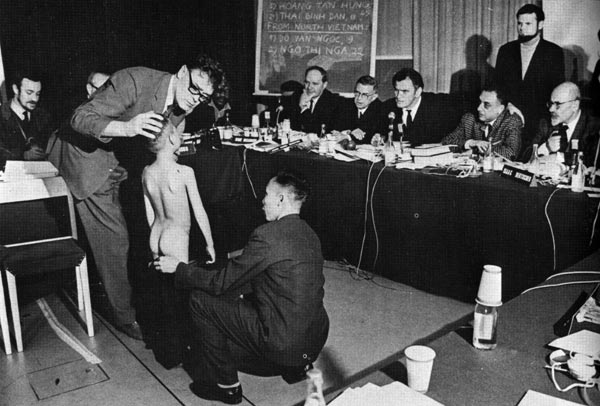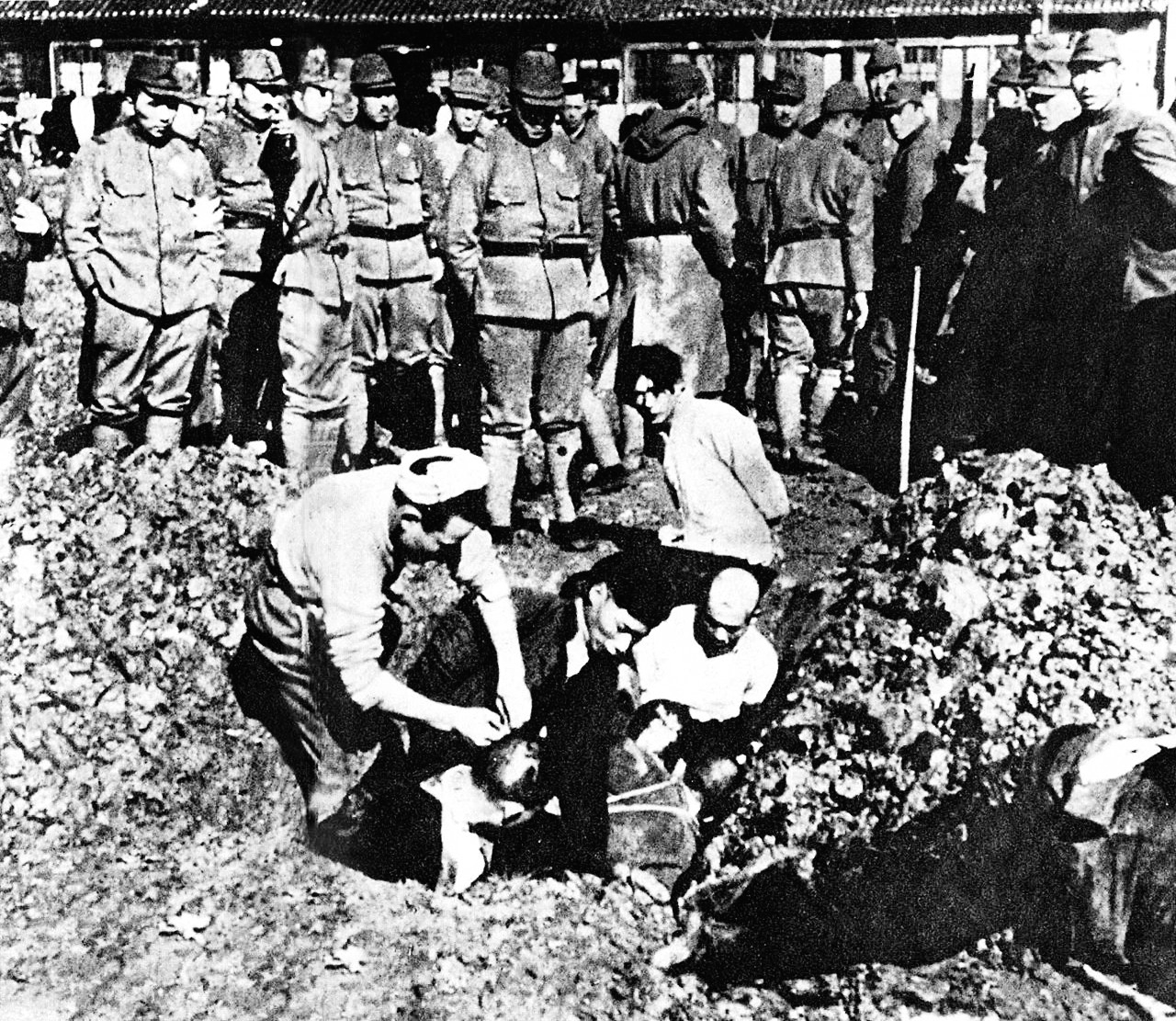|
Women's International War Crimes Tribunal On Japan's Military Sexual Slavery
The Women's International War Crimes Tribunal on Japan's Military Sexual Slavery was a private People's Tribunal organised by Violence Against Women in War-Network Japan (VAWW-NET Japan). As with the Russell Tribunal in 1967, which was not organized by any government or international institution, the verdict of this trial was not legally binding. Its purpose was to gather testimony from victims, and then to try groups and individuals for rape or sexual slavery, i.e., forcing women to sexually service Japanese soldiers. Yayori Matsui, the representative of VAWW-NET Japan, explained that the reason for holding this trial was to respond to the feelings of victims who continue to lose their cases in civil lawsuits. The group met on December 8, 2000, and was adjourned on December 12, 2000. On December 4, 2001, the group's final statement was issued in The Hague. More than 1000 paragraphs and 200 pages long, the judgment discussed the factual findings of the Tribunal, and law applica ... [...More Info...] [...Related Items...] OR: [Wikipedia] [Google] [Baidu] |
Tribunal
A tribunal, generally, is any person or institution with authority to judge, adjudicate on, or determine claims or disputes—whether or not it is called a tribunal in its title. For example, an advocate who appears before a court with a single judge could describe that judge as "their tribunal". Many governmental bodies are titled "tribunals" to emphasize that they are not courts of normal jurisdiction. For instance, the International Criminal Tribunal for Rwanda was a body specially constituted under international law; in Great Britain, Employment Tribunal, employment tribunals are bodies set up to hear specific employment disputes. In many but not all cases, ''tribunal'' implies a judicial or Quasi-judicial body, quasi-judicial body with a lesser degree of formality than a court, in which the normal rules of evidence and procedure may not apply, and whose presiding officers are frequently neither judges nor magistrates. Private judicial bodies are also often-styled tribunals ... [...More Info...] [...Related Items...] OR: [Wikipedia] [Google] [Baidu] |
The Japan Times
''The Japan Times'' is Japan's largest and oldest English-language daily newspaper. It is published by , a subsidiary of News2u Holdings, Inc. It is headquartered in the in Kioicho, Chiyoda, Tokyo. History ''The Japan Times'' was launched by on 22 March 1897, with the goal of giving Japanese people an opportunity to read and discuss news and current events in English to help Japan participate in the international community. In 1906, Zumoto was asked by Japanese Resident-General of Korea Itō Hirobumi to lead the English-language newspaper '' The Seoul Press''. Zumoto closely tied the operations of the two newspapers, with subscriptions of ''The Seoul Press'' being sold in Japan by ''The Japan Times'', and vice versa for Korea. Both papers wrote critically of Korean culture and civilization, and advocated for Japan's colonial control over the peninsula in order to civilize the Koreans. The newspaper was independent of government control, but from 1931 onward, the pa ... [...More Info...] [...Related Items...] OR: [Wikipedia] [Google] [Baidu] |
Russell Tribunal
The Russell Tribunal, also known as the International War Crimes Tribunal, Russell–Sartre Tribunal, or Stockholm Tribunal, was a private people's tribunal organised in 1966 by Bertrand Russell, British philosopher and Nobel Prize winner, and hosted by French philosopher and writer Jean-Paul Sartre, along with Lelio Basso, Simone de Beauvoir, Vladimir Dedijer, Ralph Schoenman, Isaac Deutscher, Günther Anders, Lázaro Cárdenas and several others. The tribunal investigated and evaluated American foreign policy and Vietnam War, military intervention in Vietnam. Bertrand Russell justified the establishment of this body as follows: The tribunal was constituted in November 1966, and was conducted in two sessions in 1967, in Stockholm, Sweden and Roskilde, Denmark. Bertrand Russell's book on the armed confrontations underway in Vietnam, ''War Crimes in Vietnam'', was published in January 1967. His postscript called for establishing this investigative body. The findings of the tri ... [...More Info...] [...Related Items...] OR: [Wikipedia] [Google] [Baidu] |
Ritsumeikan University
is a private university in Kyoto, Japan, that traces its origin to 1869. In addition to its main campus in Kyoto, the university also has satellite campuses in Ibaraki, Osaka and Kusatsu, Shiga. Today, Ritsumeikan University is known as one of Western Japan's most prestigious universities, part of the "Kan-Kan-Do-Rits" 関関同立 ( Kwansei Gakuin University, Kansai University, Doshisha University, and Ritsumeikan University) abbreviation that refers to the four leading private universities in the Keihanshin region. Ritsumeikan University is known for its Social Sciences, particularly International Relations (IR), as well as its Science & Engineering departments, with the Graduate School of International Relations being the only Japanese member of the Association of Professional Schools of International Affairs. History Ritsumeikan was first founded as a private academy in 1869 by Prince Saionji Kinmochi. In 1900, Kojuro Nakagawa (the former secretary of Prince Saionji ... [...More Info...] [...Related Items...] OR: [Wikipedia] [Google] [Baidu] |
Sexual Slavery
Sexual slavery and sexual exploitation is an attachment of any ownership rights, right over one or more people with the intent of Coercion, coercing or otherwise forcing them to engage in Human sexual activity, sexual activities. This includes forced labor that results in sexual activity, forced marriage and sex trafficking, such as the Child prostitution, sexual trafficking of children. Sexual slavery has taken various forms throughout history, including single-owner bondage and ritual servitude linked to religious practices in regions such as Ghana, Togo, and Benin. Moreover, slavery's reach extends beyond explicit sexual exploitation. Instances of non-consensual sexual activity are interwoven with systems designed for primarily non-sexual purposes, as witnessed in the colonization of the Americas. This epoch, characterized by encounters between European explorers and Indigenous peoples, saw forced labor for economic gains and was also marred by the widespread prevalence of ... [...More Info...] [...Related Items...] OR: [Wikipedia] [Google] [Baidu] |
Yayori Matsui
Yayori Matsui (松井やより ''Matsui Yayori'') (April 12, 1934 – December 27, 2002) was a Japanese journalist and women's rights activist noted for her work to raise awareness of sex slaves and sex tourism in post-war Asia. In 1961 she began work as a journalist for the newspaper ''Asahi Shimbun'', retiring in 1994 to work as a full-time social activist, founding numerous women's organizations and writing on gender inequality in Japan and on sex crimes committed by the Japanese Imperial Army, namely against the comfort women of the Second World War. Her work culminated in the 2000 Tokyo Women's War Crimes Tribunal, a tribunal held to gain some form of justice for the victims of Japanese military sexual slavery. Biography Matsui was born in Kyoto, Japan, to a family of Christian ministers. Her family moved to Tokyo where her parents founded the Yamate Christian Church and raised their six children. Unable to graduate from high school due to a severe case of tuberculosis, she ... [...More Info...] [...Related Items...] OR: [Wikipedia] [Google] [Baidu] |
The Hague
The Hague ( ) is the capital city of the South Holland province of the Netherlands. With a population of over half a million, it is the third-largest city in the Netherlands. Situated on the west coast facing the North Sea, The Hague is the country's administrative centre and its seat of government, and has been described as the country's ''de facto'' capital since the time of the Dutch Republic, while Amsterdam is the official capital of the Netherlands. The Hague is the core municipality of the COROP, Greater The Hague urban area containing over 800,000 residents, and is also part of the Rotterdam–The Hague metropolitan area, which, with a population of approximately 2.6 million, is the largest metropolitan area of the Netherlands. The city is also part of the Randstad region, one of the largest conurbations in Europe. The Hague is the seat of the Cabinet of the Netherlands, Cabinet, the States General of the Netherlands, States General, the Supreme Court of the Neth ... [...More Info...] [...Related Items...] OR: [Wikipedia] [Google] [Baidu] |
Comfort Women
Comfort women were women and girls forced into sexual slavery by the Imperial Japanese Armed Forces in occupied countries and territories before and during World War II. The term ''comfort women'' is a translation of the Japanese , a euphemism that literally means "comforting, consoling woman". During World War II, Japanese troops forced hundreds of thousands of women from Australia, Burma, China, the Netherlands, the Philippines, Japan, Korea, Indonesia, East Timor, New Guinea and other countries into sexual enslavement for Japanese soldiers; however, the majority of the women were from Korea. Many women died due to brutal mistreatment and sustained physical and emotional distress. After the war, Japan denied the existence of comfort women, refusing to provide an apology or appropriate restitution. After numerous demands for an apology and the revelation of official records showing the Japanese government's culpability, the Japanese government began to offer an official apology ... [...More Info...] [...Related Items...] OR: [Wikipedia] [Google] [Baidu] |
Japanese War Crimes
During its imperial era, Empire of Japan, Japan committed numerous war crimes and crimes against humanity across various Asian-Pacific nations, notably during the Second Sino-Japanese War, Second Sino-Japanese and Pacific Wars. These incidents have been referred to as "the Asian The Holocaust, Holocaust" and "Japan's Holocaust", and also as the "Rape of Asia". The crimes occurred during the early part of the Shōwa era, under Hirohito's reign. The Imperial Japanese Army (IJA) and the Imperial Japanese Navy (IJN) were responsible for a multitude of war crimes leading to millions of deaths. War crimes ranged from sexual slavery and massacres to human experimentation, torture, starvation, and forced labor, all either directly committed or condoned by the Japanese military and government. Evidence of these crimes, including oral testimonies and written records such as diaries and war journals, has been provided by Japanese veterans. The Japanese political and military leadership kn ... [...More Info...] [...Related Items...] OR: [Wikipedia] [Google] [Baidu] |
World Courts Of Women
The World Courts of Women are public hearings that give a forum to those who are traditionally excluded from formal political and legal proceedings. Organized around particular topics relevant to the hosting country, these unofficial public enquiries highlight the injustices that women face. They include testimonies of personal experience, analyses by scholars and activists, and skill-sharing and strategizing. Through these, the World Courts aim to educate and raise awareness, record injustice and human rights violations, give voice to marginalized women, and develop alternative visions and strategies for the future. Overview World Courts of Women are symbolic processes that hold unofficial public enquiries into crimes against women, including the violation of their basic human rights. The main function of these hearings is to allow an opportunity for participants to relate experiences that are not widely publicized by traditional media sources and public discourse. It aims to chal ... [...More Info...] [...Related Items...] OR: [Wikipedia] [Google] [Baidu] |
Japanese Devils
''Japanese Devils'' (or ''Riben Guizi'' ) is a Japanese documentary about the war crimes committed by the Imperial Japanese Army between 1931 and 1945. The documentary is a series of interviews with 14 Japanese veterans of the Second Sino-Japanese War who recount rape, massacres, bio-experiments, and cannibalism. The accuracy of these interviews is contested by Japanese nationalist critics. Minoru Matsui's inspiration for the film came after one of his original interviewees died. Feeling that it was his last chance to document the stories, he began the process of creating the documentary. Initial support was minimal, with all production companies showing no interest. The film did not gain any traction until it was entered into the Berlin Film Festival. The original title, Riben Guizi, is a Chinese phrase popular in the 1930s and 1940s used to express hatred for Japanese invaders. Controversy The 14 former soldiers interviewed in the film were ex-POWs of China and were subj ... [...More Info...] [...Related Items...] OR: [Wikipedia] [Google] [Baidu] |






